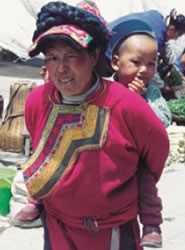Qiang, Heihu in China

Photo Source:
Copyrighted © 2026
Operation China, Asia Harvest All rights reserved. Used with permission |
Send Joshua Project a map of this people group.
|
| People Name: | Qiang, Heihu |
| Country: | China |
| 10/40 Window: | Yes |
| Population: | 27,000 |
| World Population: | 27,000 |
| Primary Language: | Qiang, Southern |
| Primary Religion: | Ethnic Religions |
| Christian Adherents: | 0.80 % |
| Evangelicals: | 0.73 % |
| Scripture: | Portions |
| Ministry Resources: | No |
| Jesus Film: | Yes |
| Audio Recordings: | Yes |
| People Cluster: | Tibeto-Burman, other |
| Affinity Bloc: | Tibetan-Himalayan Peoples |
| Progress Level: |
|
Introduction / History
The Qiang have migrated a vast distance across China during their history. During the Qin and Han dynasties (221 BC - AD 220) they lived in the present-day Alxa Prefecture in Inner Mongolia. There they joined forces with the Hun and Wuhuan peoples to fight the Chinese. Because of numerous conflicts with other nationalities in the past, the Qiang built imposing stone fortresses, many of which still stand in the remote mountain passes of western Sichuan.
The Heihu Qiang have been combined with other related groups in Sichuan to form the official Qiang nationality.
Linguist Robert Ramsey, in his overview of the Qiang, states, "The Qiang are bound together only loosely. Groups have diverged linguistically, and the Qiang in one area are frequently unable to understand the speech of those in another area. No question of mutual intelligibility could possibly arise here; if groups from two areas were to come together, it is quite likely they would have to communicate with each other in Chinese."
What Are Their Lives Like?
The Qiang have a fond love for music. They are talented singers and dancers, and love to dance to the accompaniment of gongs, tambourines and bamboos.
What Are Their Beliefs?
Missionary Thomas Torrance amazed the world in the early 1900s with his claims that the Qiang people may be one of the lost tribes of Israel. He found numerous practices in Qiang culture and religion that he believed could only have come from a knowledge of the Old Testament. On a visit to Oir in 1925, Torrance met a Qiang priest who "explained their ancient sacrificial rites and told us of their two-fold sacrifice on their annual day of atonement: one goat was slaughtered at an altar in a sacred grove at a 'high place', and one goat was released into the wilds beyond. When my father read to the priest and his family the sixteenth chapter of the book of Leviticus, in which details of this same rite are found in the ancient Hebrew liturgy, the old priest leaped up from his stool in excitement, saying that these were the lost Qiang Scriptures!"
Mao's communist forces destroyed several Qiang churches when the Long March passed through the region in the summer of 1935. "All Qiang pastors and most of their families were executed by Mao's men. The communists tried to burn all Bibles and New Testaments, even tried to destroy the Christian's grain, so as to eliminate the Christian communities established in Wenchuan and Lifan counties. But in Tongmenwai the Christians saved some of their Bibles by burying them in caves. They resurrected them after Mao's forces had passed on."
What Are Their Needs?
Like all Qiang groups, the Heihu need the spiritual hunger it will take to seek and find the Lord.
Prayer Points
Pray that the sheer wonder of knowing Jesus and the impact he has on their lives and the joy he brings spur believers to share Christ with the Heihu Qiang people.
Pray the hearts of the Heihu Qiang people would be stirred by a sovereign work of the Holy Spirit readying them for the time when they hear the gospel message being shared with them.
Pray they will experience dreams and visions of Jesus leading them into a saving relationship with him.
Pray for an unstoppable movement to Jesus Christ among the Heihu Qiang people.